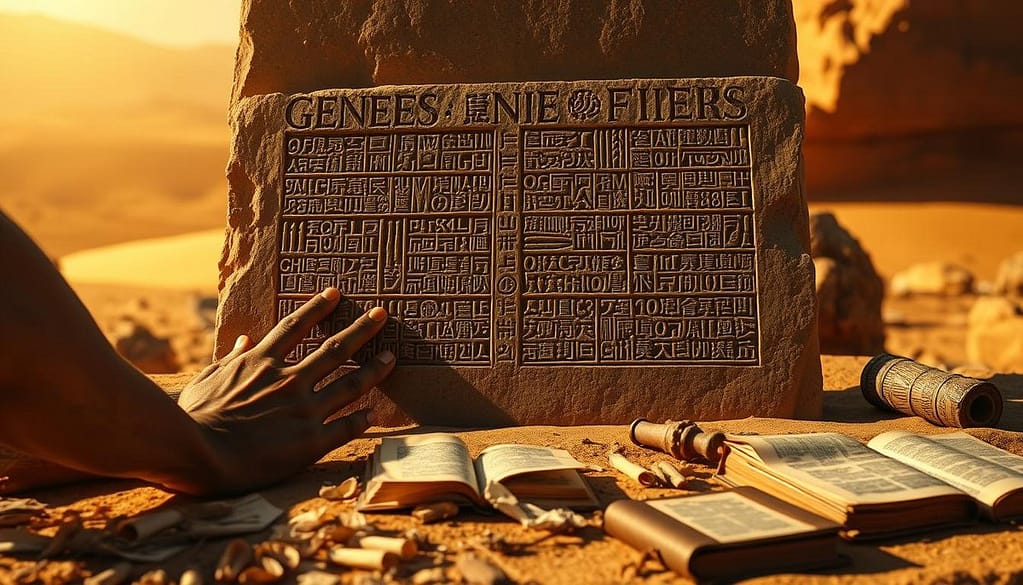Who Wrote The Bible Genesis
Who Wrote The Bible Genesis: Did you know the Book of Genesis is about 3,000 years old? It has 50 chapters, leading to big debates about who wrote it.
Scholars wonder who wrote the bible genesis, and the answer is not simple. Traditionally, Moses is credited, but some think it was written by many over time.
This raises big questions about who wrote the book. As you learn more, you’ll see Moses is mentioned in the Bible as the author. Yet, Genesis itself doesn’t say Moses wrote it.
This has made the debate about its authorship very interesting.
Exploring who wrote Genesis takes you through the history of studying the Bible. You’ll see different views on who wrote it, from old beliefs to new debates.
It shows how important it is to understand who wrote Genesis and why.
The Historical Context of Genesis Authorship
The writer of the biblical book of Genesis is a topic of much debate. Scholars argue about who wrote the book. The traditional view is that Moses wrote it, but the actual process is more complex.
The ancient Near East played a big role in Genesis’s creation. Oral tradition was key, passing down stories and legends through generations. This shaped the book, influenced by the culture and history of the time.

When did Genesis get written? Scholars have different theories. But most agree it took several centuries. The writer likely used earlier stories and records to create the book we have today.
The Ancient Near Eastern Setting
The ancient Near East was rich in culture and history. It was home to many civilizations, each with its own traditions. The writer of Genesis was influenced by this diversity, blending elements from various sources into the book.
Traditional Attribution to Moses
For centuries, many have believed that Moses wrote Genesis. As the author of genesis, he is credited with the first five books of the Bible.
This belief comes from the Pentateuch, which Moses is said to have written.
The biblical genesis author is thought to be Moses, who lived from 1446–1406 BC. This time allows for thirty-nine years to write the Torah.
The Torah’s structure, with poetry and narratives, supports this timeline.
Some key points support Moses’ authorship of Genesis:
- The Ketef Hinnom scrolls, from the seventh century BC, confirm the existence of biblical texts by then.
- The tradition of Mosaic authorship of the Torah likely started with Deuteronomy’s legal code.
- The Torah’s transmission, from Moses to Joshua and then others, supports this belief.

Despite debate, many scholars believe Moses wrote Genesis. The idea that Moses wrote the book remains a topic of study and discussion.
Who Wrote The Bible Genesis: Modern Scholarly Perspectives
Exploring the Book of Genesis’s authorship reveals many theories. These include the documentary hypothesis and the multiple author theory.
The genesis book writer is a subject of debate. Some think it was written by one person, while others believe it was a team effort over time.
The documentary hypothesis suggests Genesis was written by at least four authors: J, E, D, and P. It says these authors worked at different times, with the genesis writer combining their work.
Yet, there’s no solid proof for this theory, and finding the genesis author identity is a challenge.
- The tradition of Mosaic authorship, which many biblical references support
- The documentary hypothesis, which suggests multiple authors and a complex writing process
- The bible genesis author and the role of inspiration in writing the book
The question of who wrote Genesis is complex and debated. Biblical scholarship offers many theories and perspectives. Yet, the search for the genesis author identity is an ongoing discussion.
Understanding the Writing Style and Structure
The Book of Genesis is a unique and complex text. It has been studied and interpreted for centuries.
When we look at the genesis author question, we must consider its writing style and structure. The biblical origins of Genesis show in its historical context and literary structure.
The book is split into two main parts. Chapters 1-11 tell the story of God and the world. Chapters 12-50 focus on God and Abraham’s family.
This split shows the origins of genesis and why Abraham’s family is important in the Bible.
Genesis has some key features in its writing style and structure. These include:
- The use of a “hinge” story to connect the narratives
- The emphasis on transitions between cosmic history and intimate family accounts
- The systematic use of literary formulas, such as genealogies and prophetic predictions

By studying Genesis’s writing style and structure, we can understand the genesis author question better. This helps us see the biblical origins of the book. It also gives us insights into the origins of genesis and its role in the Bible.
| Section | Chapters | Description |
|---|---|---|
| 1 | 1-11 | Story of God and the world |
| 2 | 12-50 | Story of God and Abraham’s family |
Evidence from Ancient Hebrew Texts
Exploring the world of biblical authorship, ancient Hebrew texts are key. The genesis author research has deepened our understanding of the bible authors.
It shows how they contributed to the sacred texts. The literary analysis of Genesis offers insights into the writing style and structure.
Scholars have found clues about the biblical author identity and the texts’ historical context. The Ketef Hinnom scrolls, dating back to the seventh century BC, are a significant find.
They contain text in paleo-Hebrew characters, showing advanced literary skill.
Comparative Studies with Other Ancient Texts
Comparative studies with other ancient texts are also vital. They help understand the bible authors and their work.
By comparing literary styles and structures, scholars find similarities and differences. This research enhances our understanding of the genesis author research and the bible authors.
Some key findings include:
- The use of paleo-Hebrew characters in the Ketef Hinnom scrolls
- The presence of the Priestly Blessing in the texts, which dates back to the seventh century BC
- The discovery of other ancient texts that demonstrate a high level of literary sophistication
The Role of Divine Inspiration
Exploring the biblical text origins leads us to divine inspiration. This idea says a higher power guided the religious scripture writer to write the book of genesis history.
The process of divine inspiration is complex and not fully understood. It’s believed that God chose and prepared the writers of the Bible.
Their writings are seen as the final product of divine inspiration, not their personal qualities.
Theological Perspectives
Theological views on divine inspiration differ, but most agree it’s key to the Bible’s authority. The idea of verbal plenary inspiration means every word in Scripture was inspired by God.
Religious Significance
The religious importance of divine inspiration is huge. It shows the Bible’s role as a moral and spiritual guide. This concept makes the Bible a sacred text, guiding people on their spiritual paths.
- 100% of Scripture is claimed to be “God-breathed” according to 2 Timothy 3:16-17.
- The term “verbal plenary inspiration” indicates that the inspiration applies to every individual word across all parts of Scripture.
- The Bible asserts that every word contributes to its authority and ability to teach; it is not restricted to parts concerning religious doctrines.
In conclusion, divine inspiration is key to the book of genesis history‘s significance and authority. Understanding this concept can deepen our appreciation for the biblical text origins and the religious scripture writer‘s role in creating a sacred text.
Cultural and Historical Impact of Genesis Authorship
The ancient hebrew literature has deeply influenced our culture and history. The biblical creation account in the genesis book is often credited to Moses. This has shaped many religious beliefs and values.
Genesis has inspired countless people throughout history. Its influence can be seen in art, literature, and more. It has been a source of inspiration for many.
The story of Genesis has shaped our worldview. It has been debated for centuries. The genesis book author used creation to share important messages.
Some key aspects of Genesis’ impact include:
- The influence on Western literature and art
- Its role in shaping our view of the natural world
- Its impact on religious traditions and beliefs
Studying ancient hebrew literature and the biblical creation account offers insights. By looking at the language and themes in Genesis, we understand the author’s message better.
| Aspect | Influence |
|---|---|
| Western Literature | Shaped our view of the world and our place in it |
| Natural World | Shared themes like stewardship and God’s relationship with humanity |
| Religious Traditions | Influenced the development of religious beliefs and practices |
Modern Interpretations and Academic Research
Exploring biblical studies reveals ongoing debates about the Book of Genesis. Scholars are keen to understand who wrote it.
They dive into the genesis bible author and their impact on the story.
Archaeological finds have given us new insights into Genesis. For instance, ancient texts like the Targums to Genesis 1:1 have enriched our understanding. They help us grasp the creation story’s depth.
Contemporary Scholarly Debates
Scholars today disagree on Genesis’s meaning. Some view it as a scientific text, while others see it as a theological or literary work. Here are some main views:
- Concordist interpretations, which try to match the Bible with science
- Non-concordist interpretations, focusing on the text’s spiritual and literary value
- The Gap Interpretation, suggesting a time gap between the universe’s creation and humans
- The Day-Age Interpretation, where creation days are seen as long periods
Exploring these views helps us understand Genesis’s complexity. It shows the ongoing search for the genesis bible author and their goals.
| Interpretation | Description |
|---|---|
| Concordist | Seeks to reconcile biblical account with scientific evidence |
| Non-concordist | Emphasizes theological and literary aspects of the text |
| Gap Interpretation | Posits a gap in time between creation of universe and humanity |
| Day-Age Interpretation | Sees days of creation as representing long periods of time |
Conclusion: Who Wrote The Bible Genesis
The authorship of the Book of Genesis is a topic of long debate. Scholars have argued for centuries about who wrote it.
The biblical book genesis writer, genesis bible writer, genesis book authorship, and biblical genesis authorship all play a role in understanding this key text.
It’s hard to say for sure who wrote Genesis. Yet, the evidence from ancient Hebrew texts and archaeological discoveries enrich our view of its origins.
As you dive deeper into the Bible, may you grow in awe and respect for the Genesis story and its lasting influence.
FAQ
Who wrote the Book of Genesis?
Scholars have debated who wrote the Book of Genesis for centuries. Some say Moses wrote it, while others propose the documentary hypothesis. This theory suggests multiple authors over time.
What was the historical context in which Genesis was written?
Genesis was written in a specific time and place. The ancient Near East and oral tradition were key. They helped pass down stories and legends.
Is there evidence to support the traditional attribution of Genesis to Moses?
The idea that Moses wrote Genesis comes from the Pentateuch. Yet, other scholars argue it was written by multiple authors over time.
What are the modern scholarly perspectives on the authorship of Genesis?
Today, scholars have different views on Genesis’ authorship. The documentary hypothesis and multiple author theory are popular. They look at archaeological evidence to support their claims.
How does the writing style and structure of Genesis contribute to understanding its authorship?
Genesis’ unique writing style and structure offer clues about its authorship. These elements reflect the book’s historical context.
What evidence from ancient Hebrew texts can shed light on the authorship of Genesis?
Ancient Hebrew texts offer insights into Genesis’ authorship. Literary analysis and comparisons with other texts can reveal evidence.
How do theological perspectives and religious significance influence the understanding of Genesis authorship?
Genesis is sacred to many, seen as divinely inspired. Theological views and religious importance add to our understanding of its authorship.
What is the cultural and historical impact of the authorship of Genesis?
Genesis has shaped beliefs and values across many religions. Its authorship is key to its cultural and historical impact.
How do modern interpretations and academic research continue to shape our understanding of Genesis authorship?
Ongoing research and interpretations keep evolving our view of Genesis’ authorship. New discoveries and debates offer fresh perspectives.







